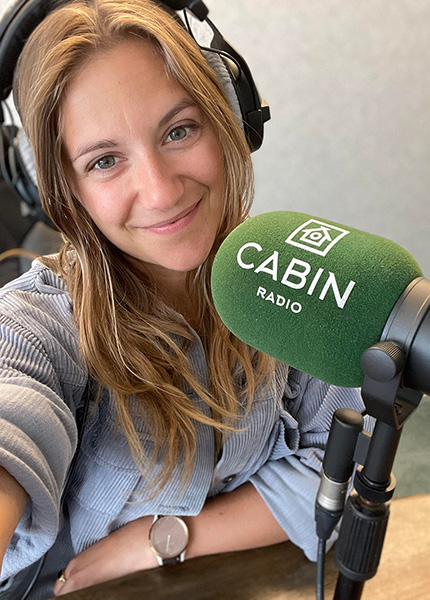Laurissa Cebryk is a second-year Master of Journalism student who worked at Cabin Radio in Yellowknife during the summer and completed an internship at JAR Audio in the fall.


I wanted to try audio. My requirements for my internship were that I wanted to get paid, and I wanted to take advantage of an opportunity to go somewhere different. And I wanted to be able to do everything, so I would need a small, hands-on type of place. Cabin Radio kind of fit all of that, plus they have a large Indigenous community so there was a lot of learning to have more sensitive reporting.
What was the process of getting this internship?
The application was really early, so I knew by Christmas that I had the internship, and that I was going to Yellowknife for the summer.
You had to apply with three pitch ideas. Then you did your interview, and Ollie, the news editor, asked you to walk through the process of why you chose those pitches, how you would go through reporting, your process, and just general questions about experience reporting in smaller communities and where you see yourself in journalism.
Within the next week, he told me I had a position. So it was a really fast turnaround.
What was your role like?
I did mostly written pieces. The radio is kind of separate. The office building when you go in, they have the radio station on one side and all the writers are on the other side. I could’ve done a better job of making sure I did radio stuff, but I was shy about it. I joined in on a few radio shows, and some of the interviews I did I would trim and edit so they could be played on certain radio shows, but most of my work was writing. I had 36 bylines by the time I left.
Some stories you’d file like 6 times a day, and I did a long-form one and I worked on that for the entire six weeks. You could pick what you wanted to write as well, which was cool.
What was it like working in a community like Yellowknife?
Yellowknife was beautiful. When I got there, I got a little bit of the 24-hour sunlight, and by the time I left in mid-August we had the aurora [borealis], so I got to see the Northern Lights.
It’s cute, very community oriented. Because it’s so small, you have the same resources. After six weeks of writing a lot of stories, you know who the right person to go to is. I felt like I was part of it.
Something I’ve struggled with in Vancouver is building community and feeling like you actually have an impact, so it felt good to get that in Yellowknife. Some of the stories I worked on, people were messaging me afterwards like, “thank you so much, you captured this really well,” and, “I appreciate you being able to talk to me about this,” so it felt like you made a difference with your story. And you know people read them, so that’s cool.
Was there anything you learned in your first year that helped you?
I didn’t really expect to be good at news writing, and I didn’t really think I would be set up for a newsroom. But when I got there and started pitching pieces my editor said that the things that were coming across his desk were what he’d expect from a journalist reporting. So I think I was better prepared than I realized once I started doing it.
In our first year, we were told a lot to just start calling people. I got really good at that [at Cabin Radio]. I did that every day.
One of the stories I worked on was about the Pope’s apology on Canadian soil. There’s a lot from Saranaz’s class about trauma-informed reporting and being open and not assuming positions. I definitely used that when reporting within Indigenous communities.
What were your biggest learning experiences?
A lot of it was learning to organize stories better and writing more concisely in a more news-oriented fashion. I learned a lot about trying to go with people’s answers rather than expecting what they were going to tell me and the ability to pivot quickly.
Was there a favourite episode or moment you worked on?
Yellowknife does an extreme rubber ducky race every year for charity. We went out and filmed this really extra video, and one of my jobs was to go out in a canoe and catch all the ducks as they came out of the rapids. You just see thousands of yellow ducks come flooding out and you have to catch them with this big net before they go over the waterfalls.
Do you have any advice for people looking for non-conventional internships?
I highly encourage it. I think if you’re adventurous and you want to try something different, anything with school is always such a great opportunity to do that and try that out.


